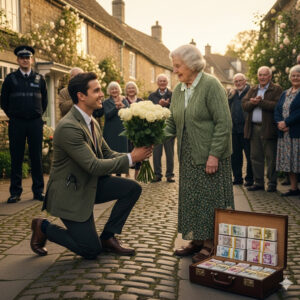

On the morning of the village market, the dew still wet the palm roofs. Doña Lupita, hunched over, pushed her scrap cart past the large market. His feet, hardened by years of walking, and his skinny, wrinkled hands dragged a heavy sack. She had no one nearby, she lived alone in a ramshackle hut on the bank of the canal, collecting every day what others threw away to exchange it for corn or beans and survive.

That day, in a corner of the market, he heard a faint cry. A newborn baby, still red and fragile, had been left inside an old aluminum basin. Next to him, a crumpled piece of paper read:
“Please, someone with a good heart take this child in.”
Doña Lupita remained motionless. His cloudy eyes slowly stopped in that little life. No one was approaching. People passed by, shaking their heads, muttering annoyedly,
“In these days, if you can barely feed yourself, who would dare to take on a fate as heavy as a mountain…?”
But Doña Lupita was different. She picked up the baby with her trembling hands. The boy grabbed his finger and squeezed it gently. The old woman’s heart trembled, but at the same time it was filled with an unexpected warmth.
“Son, you don’t have anyone… and I don’t have anyone either. Let’s go together, yes? he whispered tenderly.
From that day on, the humble hut had the cry of a baby, the flickering light of the lamp lit until dawn, and an elderly mother who carefully measured every drop of milk and every spoonful of atole to raise that child with everything she had.
In the poor neighborhood they called her crazy. Some even said directly:
“You raise him and when he grows up he will leave, he will leave you alone. It’s not from your blood, you’re just putting a weight on yourself.
She was just smiling, her gaze lost on the horizon:
“Maybe so. But now I have a child who calls me “mom.” In my life, I have never had anything so beautiful.
She named the boy Esperanza, although everyone called him Hugo – because for her he meant that: hope. She grew up with soaked hard tortillas, with patched clothes, but also with values, respect and affection that her mother instilled in her, in addition to the determination to study.
Every night, Doña Lupita went out to collect cardboard and bottles until very late. Still tired, she washed Hugo’s school uniform. The boy, when he saw her, felt more love and strength to overcome himself. He was always the best in his class, until he managed to enter the UNAM School of Medicine with a full scholarship.
The day he received the acceptance letter, Hugo hugged his mother crying his eyes out. She smiled and put two hundred folded pesos in his hand – all he had at that moment – and said:
“Go study, son. Become a good man. I don’t need anything else, if you live with goodness it is enough for me.
Twenty years later.
The old and perforated hut had been transformed into a modest but dignified little house. That day, after returning from his internship abroad, the entire neighborhood gathered in front of the house to see how Dr. Hugo came to pick up his mother to take her to the city.
He got out of the car dressed in a white coat and a large bouquet of flowers in his hand. He knelt in front of her:
“Mom, I’m already a man. From today I want to take care of you, as you took care of me.
The neighbors saw Doña Lupita’s wrinkled eyes moisten, but shine like never before. She didn’t need anyone to acknowledge that she had been right. His happiness was there: a grateful son, full of love and nobility.
And she understood that motherhood does not need blood ties: true love is enough.
That day, when Hugo bowed to her, the whole neighborhood was silent. Some recalled the mockery of yesteryear. Others could not hold back their tears as they saw the trembling old lady stroke the hair of her son, now a tall and successful man.
“Son… I’m already old. I don’t need luxuries or riches. I just want to see you live with kindness, heal and help people. That is enough for me to die in peace.
Hugo clenched his hands hardened by the years:
“Mom, all your life you sacrificed yourself for me. Now it’s my turn to give you peace, to give you joy. You will no longer suffer from hunger or loneliness. Let me take care of you, as you took care of me.
The bouquet of flowers was left in the old woman’s hands. And as Hugo helped her into the car, amid applause, smiles, and tears from the neighbors, everyone understood that this woman, once despised for her “madness,” was now the happiest in the world.
Because true happiness is not measured in money or blood ties.
Happiness is sometimes just a hug, a voice that says “mom,” and a heart that knows how to love.
Để lại một phản hồi